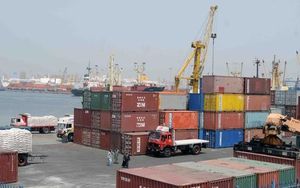The Madras High Court is poised to deliver a significant verdict on April 23, 2025, concerning the Tamil Nadu State Marketing Corporation (TASMAC) and its legal battle against the Enforcement Directorate (ED). The case centers around allegations of financial misconduct following ED raids conducted from March 6 to 8, targeting TASMAC's operations.
In recent hearings, a division bench comprising Justices S.M. Subramaniam and K. Rajasekar has listened to extensive arguments from both sides. TASMAC, alongside the Tamil Nadu government, has filed petitions challenging the legality of the ED's search and seizure operations, claiming they violate principles of federalism.
The ED alleges that its investigations uncovered a substantial financial fraud, involving unaccounted cash and illicit payments linked to distilleries associated with TASMAC. The scale of the alleged scam is significant, with estimates exceeding Rs. 1000 crore, suggesting collusion between TASMAC and local bottling companies.
During the proceedings, Advocate General P.S. Raman represented the state government, while senior counsels Vikas Singh and Vikram Choudhary defended TASMAC. Singh argued vehemently that the ED lacked jurisdiction to conduct searches at TASMAC's headquarters in Chennai, labeling the actions as a "complete abuse of power." He expressed serious concerns about the ED's reliance on FIRs registered by the Directorate of Vigilance and Anti Corruption (DVAC) against lower-level staff, including depot managers, suggesting that such investigations should follow a more conventional approach.
Singh stated, "In a normal investigation, it should be the other way round. There is a case registered, you start an investigation on that. Here, it is the opposite. ED decides, they collect FIRs and then start an investigation. This is a unique case where ED does not even confirm the predicate offence." He argued that the ED's jurisdiction does not extend to the case at hand, emphasizing that the individuals implicated are too low-level to warrant such scrutiny.
Further complicating the matter, the Advocate General raised concerns about potential overreach by central agencies, warning that unchecked powers could lead to similar actions against other state-owned enterprises. Raman cautioned, "If the central agency is allowed unchecked, then it would do the same with other state-owned undertakings. They would then end up scouting for materials to implicate higher authorities of such institutions, thereby directly challenging the federal character of the country."
Additionally, allegations of human rights violations surfaced during the hearings, with claims that ED officials detained female staff members beyond midnight during the raids. The Advocate General accused the ED of failing to seek assistance from the state government before initiating their operations. However, the ED's counsel, Additional Solicitor General S.V. Raju, firmly denied these accusations, asserting that the operations were "warranted and justified to unearth the money laundering activities."
The case has drawn considerable attention, not only for its implications on TASMAC but also for the broader questions it raises regarding the balance of power between state and central authorities in India. The ED's prior investigations have already extended to other government departments, including TAMIN and TNMAWS, further intertwining the agency's actions with state governance.
On March 20, the court had temporarily restrained the ED from taking further coercive actions, but the situation escalated when Justices M.S. Ramesh and N. Senthilkumar recused themselves from the case. Subsequently, the matter was transferred to the current division bench, which has now reserved its ruling.
As the April 23 verdict approaches, the stakes are high for both TASMAC and the ED. If the court rules in favor of TASMAC, it could set a precedent regarding the jurisdictional limits of the ED and the rights of state-owned enterprises under investigation. Conversely, a ruling in favor of the ED could empower the agency to pursue further inquiries into state operations, potentially reshaping the landscape of state-central relations in India.
The outcome of this case could reverberate beyond TASMAC, influencing how similar cases are handled in the future and affecting the operational dynamics between state governments and central investigative agencies. As both sides await the court's decision, the implications of this ruling will likely be felt across various sectors involved in state governance and oversight.
In summary, the Madras High Court's ruling on April 23 is set to be a pivotal moment in the ongoing legal battle between TASMAC and the ED, raising essential questions about jurisdiction, federalism, and the extent of investigative powers in India.






